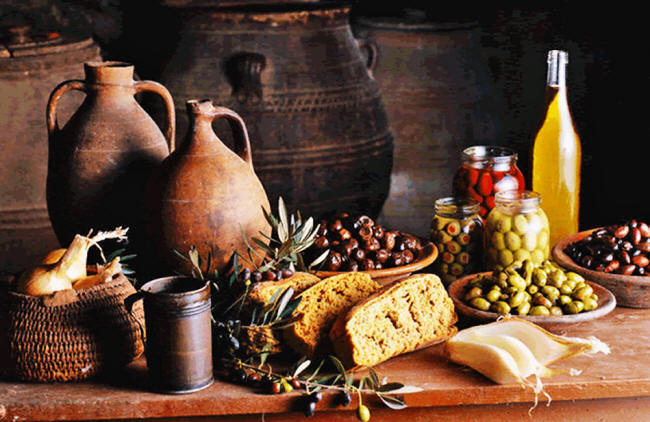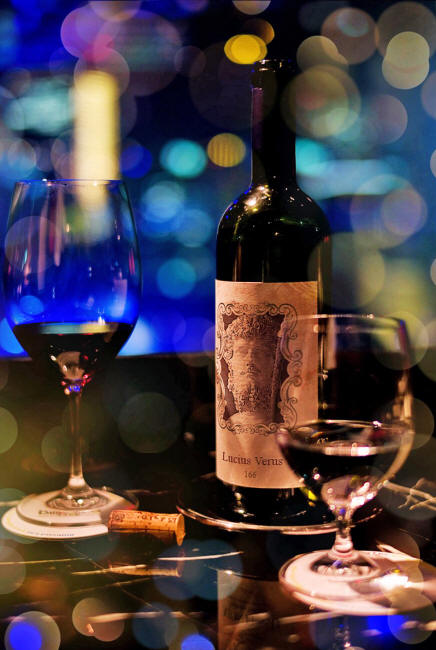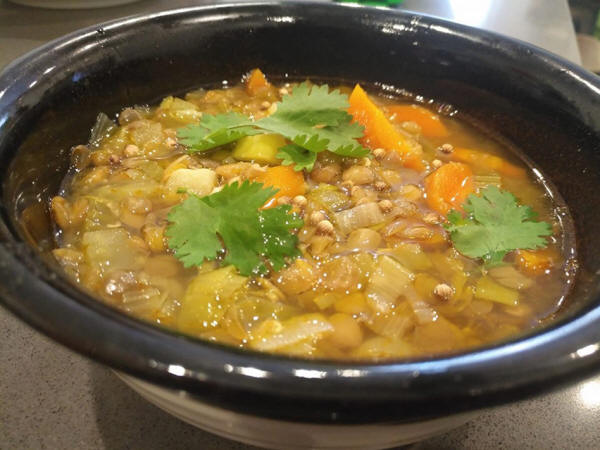|

by Donald Robertson
October 21,
2019
from Medium
Website
Italian
version

The ancient Cynic and Stoic philosophers were very interested in
food.
They talk both about
what we should eat and how we should eat it, if we want to live
wisely and gain strength of character.
For instance, we're told
of the Stoic teacher
Musonius Rufus:
He often talked in a
very forceful manner about food, on the grounds that food was
not an insignificant topic and that what one eats has
significant consequences.
In particular, he
thought that mastering one's appetites for food and drink was
the beginning of and basis for self-control.
Musonius taught that
Stoics should prefer inexpensive foods that are easy to obtain and
most nourishing and healthy for a human being to eat.
It might seem like common
sense to "eat healthy" but the Stoics also thought we potentially
waste far too much time shopping for and preparing fancy meals when
simple nutritious meals can often be easily prepared from a few
readily-available ingredients.
Musonius advises,
Eating plants and
grains rather than slaughtered animals.
He recommends fruits
and vegetables that do not require much cooking, as well as
cheese, milk, and honeycombs.
The Stoic weren't
strictly vegetarian - unlike their philosophical cousins the
Pythagoreans.
Some Stoics were
probably vegetarian and others not, although they wouldn't have
eaten very much meat in general.

The Early
Stoic and Cynic Diet
Zeno of Citium, the founder of the Stoic school, had
for many years been a Cynic philosopher.
"Zeno", we're told
"thought it best to avoid gourmet food, and he was adamant about
this."
He believed that once we
get used to eating fancy meals we spoil our appetites and start to
crave things that are expensive or difficult to obtain, losing the
ability to properly enjoy simple, natural food and drink.
We know more about the Cynic diet because it was simpler and more
austere.
The Cynics were known, typically,
for drinking water (instead of wine), and eating barley-bread and
lentil soup or lupin beans - all very cheap ingredients.
One Cynic letter says:
"It is not only bread
and water, and a bed of straw, and a rough cloak, that teach
temperance…"
We're told of
Crates, the Cynic teacher of
Zeno, who abandoned his fortune:
Having adopted
simpler ways, he was contented with a rough cloak, and
barley-bread, and vegetables, without ever yearning for his
former way of life or being unhappy with his present one.
The Stoics were generally
more urbane and less extreme than their Cynic predecessors, and
their diet seems to have been a bit less restricted.
However, right down until
the time of the last famous Stoic of antiquity, the Roman emperor
Marcus Aurelius, we hear about
some Stoics modeling themselves on the Cynic lifestyle, which in
turn appears to have been influenced by aspects of the notorious
Spartan agoge or training.
For example, in a letter to Marcus Aurelius, we find his rhetoric
tutor and family friend, Marcus Cornelius Fronto, joking
about how he saw one of the emperor's little sons clutching a chunk
of brown bread,
"quite in keeping
with a philosopher's son."
In another letter, we get
a glimpse of Marcus' eating habits:
Then we went to
luncheon. What do you think I ate? A wee bit of bread, though I
saw others devouring beans, onions, and herrings full of roe.

Eating with
Attention and Moderation
Musonius also thought we should train ourselves to avoid
gluttony:
Since this behavior
[gluttony] is very shameful, the opposite behavior - eating in
an orderly and moderate way, and thereby demonstrating
self-control - would be very good.
Doing this, though,
is not easy; it demands much care and training.
Stoics should eat slowly
and with mindfulness of their own character and actions, paying
attention (prosoche) to their thoughts and actions.
They should use reason to
judge where the boundary of what's healthy lies and exercise
moderation wisely.
The person who eats
more than he should makes a mistake.
So does the person
who eats in a hurry, the person who is enthralled by gourmet
food, the person who favors sweets over nutritious foods, and
the person who does not share his food equally with his
fellow-diners.
[…]
Since these and other
mistakes are connected with food, the person who wishes to be
self-controlled must free himself of all of them and be subject
to none.
One way to become
accustomed to this is to practice choosing food not for pleasure
but for nourishment, not to please his palate but to strengthen
his body.
That very simply means
making an effort to eat
healthy food...
However, for Stoics the
main reason for doing this isn't just to improve our health,
paradoxically, it's to strengthen our character by exercising
self-awareness and the virtue of self-discipline.
That's important today
because we're bombarded with contradictory advice about the
healthiest way to eat.
The Stoics would say
that,
we shouldn't allow
that to confuse us.
We should make a
reasonable decision and stick to it in order to develop
self-control because that's fundamentally more important than
losing weight or becoming physically healthy anyway.
To be clear, both goals
are of value, but for Stoics the primary goal is strength of
character and physical health, while "preferred" as they phrase it,
is of secondary importance.
Therefore, the goal
of our eating should be staying alive rather than having
pleasure - at least if we wish to follow the sound advice of
Socrates, who said that many men live to eat, but that he
ate to live.
No right-thinking
person will want to follow the masses and live to eat, as they
do, in constant pursuit of gastronomic pleasures.
Many people who follow
Stoicism today also employ intermittent fasting.
It's likely that some
ancient Stoics did too, I think.
Socrates famously
said that "hunger is the best relish", alluding to the irony that we
actually enjoy our food more when we're hungry, and spoil our
appetites when we over-indulge.
I fast at least once
a week, sometimes eating and fasting on alternate days.
For lunch I tend to
eat dakos, a simple Cretan salad made from barley-bread
rusks, perhaps like the ancient Spartans and Cynics used to eat,
and a few common ingredients like chopped tomatoes, olives, and
feta.
I think Musonius, and the
other Stoics, would also approve of the recipe below because it's
very cheap, mainly uses common vegetable ingredients, which are easy
to obtain, and it's also very easy to prepare.
You can easily make a
large batch and store it in portions to reheat later.
It's unfussy but tasty
and nutritious.
Recipe for
Stoic Soup
In Meals and Recipes from Ancient Greece, Eugenia Ricotti
describes the following recipe called "Zeno's Lentil Soup".
It's a modern recipe
loosely based upon ancient sources, including remarks attributed to
Zeno of Citium, the founder of Stoic philosophy, which are found in
the Deipnosophistae (or "Dinner Experts") of Athenaeus of
Naucratis.
She says to rinse the
lentils and put them in a pot with the broth to boil.
Then reduce heat and
simmer for one hour. Then skim the top, add the vegetables, and
leave to simmer until cooked, which should be about 30 minutes.
She says that if it seems
too watery either add cornstarch or pass some of the lentils through
a sieve. Finally, add vinegar and honey for flavor.
After pouring into serving bowls, add a good amount of olive oil -
she suggests about 2 tablespoons per serving. Finish by sprinkling
on the coriander seeds and adding more salt and pepper to taste.
I've made this recipe quite a few times myself.
I use dried green
lentils, which I soak overnight and boil for a few minutes.
I use red wine
vinegar and often add a couple of garlic cloves and perhaps a
few bay leaves, possibly also a little paprika.
I'd also usually
garnish it with a few fresh coriander leaves and serve with
bread.
This is a photo of my
version…

| 




